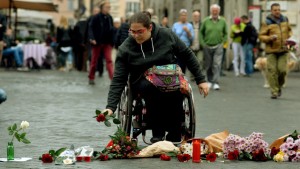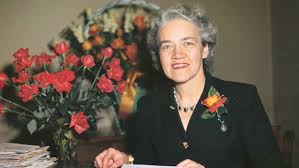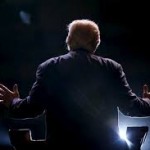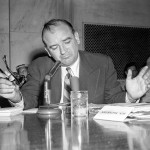Conscience matters in a ‘mute world’
A suggested anecdote to demagogues who urge us to know nothing and suspect everything.

A woman brings flowers outside the French Embassy in Rome after the deadly attacks in Paris. (Photo credit: Tiziana Fabi/AFP/Getty Images)
Columnist Roger Cohen of The New York Times wrote Monday, “It would be hard to imagine an atmosphere better suited to the politics of fear.”
He’s spot on.
We’re on the precipice of being consumed by our fears. Of jihadists infiltrating the country. Of a failing strategy to “demolish” the rising Islamic State. Watching Europe being overrun by Middle East immigrants spurs similar concerns at home.
Perhaps most potently, we’re scared of examining the true causes of these fears. Aren’t they really symptoms of something else?
We feel worn down by events that we have no control over. We need scapegoats to pin our anxieties on. Our children’s future—finding good jobs, and climate change threatening other generations—is in doubt. Afraid of looking deeper at the root of our fears, we grab at easy answers.
It is precisely at this juncture when we must rise to the occasion.
We see images of ruthless people executing innocents, and imposing brutal Sharia law in ancient places that we’ll never go to, less understand. Mass shootings at home that make us feel helpless while pathetic elected leaders do nothing in response. We see outrage in the streets of Chicago, Baltimore, and Ferguson—and where’s the latest violation?
All of this alarms us–until the repetition of events and distorted facts become a blurred smudge. Until we don’t see and hear or feel them any more.
Yet, let’s step back for a moment. Try observing this in a different light. Because there is another way.
It is precisely at this juncture, amidst these torrents of uncertainty and fear, when we must rise to the occasion. Not by abandoning our principles, or sinking to the level of the fanatics and demagogues. We forget this at our peril. Been there, done that.
We must be guided by conscience instead. Responding to seemingly intractable conflicts by rejecting the voices of division and fear mongering.
The alternative to acting with conscience is an abyss.
An absurd life of ever-spiraling retribution and violence. A meaningless life. In which we hear only “the unreasonable silence of the world,” the French existentialist Albert Camus wrote. A “mute world.”
Another newspaper columnist, the Boston Globe’s Kevin Cullen, put this in his own estimable way. Writing shortly after a couple opened fire and killed 14 people in San Bernardino, California, apparently driven by jihad, Cullen considered how paralyzed Americans feel in the wake of such indiscriminate killings.
“Does the number of casualties make a difference?” he wrote. “Do the ages or genders of the victims?…The motivation of the shooters? Does a terrorist trump a racist? Is a zealot more noteworthy than a nut? Is there a difference?
“All questions worth pondering, as is this one: is the frequency of mass shootings and their ubiquity in all corners of our popular culture getting to the point that instead of caring more we care less, that carnage becomes so routine that it is greeted not with a shriek but a shrug?”
“The real danger in being desensitized, to anything, is the apathy that is its byproduct, the sneaking belief that nothing can be done to alter the status quo.” — Kevin Cullen, the Boston Globe, Dec. 3, 2015
Nothing can be done. In a mute world. With a view from nowhere.
Yet following one’s conscience offers a way out.
Sixty-five years ago, the first female elected to the U.S. Senate gave a speech that all Americans should heed today. Margaret Chase Smith’s scathing “Declaration of Conscience” criticized both her fellow Republicans and Democrats for failing to stand up to the demagogue of their day, Senator Joseph McCarthy. McCarthyism was in full force, cowing many Americans from speaking out.
Chase, a freshman senator from Skowhegan, Maine, stood up to the bullying noise.

Senator Margaret Chase Smith, who took on the demagoguery of Sen. Joseph McCarthy, below, in her “Declaration of Conscience: in 1950. Source: History.com
“I do not want to see the Republican party ride to political victory on the Four Horsemen of Calumny—Fear, Ignorance, Bigotry, and Smear,” she declared in a speech that was recalled last week by WBUR’s “Radio Boston.”
“Today our country is being psychologically divided by the confusion and suspicions that are bred…to spread like cancerous tentacles of ‘know nothing, suspect everything’ attitudes,” Smith said.
As Yogi Bera declared: It’s déjà vu all over again.

So where do we go with this?
Part of the challenge is to separate the facts from the ego-spin.
In the case of fighting ISIS, we should recognize that it is a caliphate, an Islamic state intent on taking over countries from North Africa into Asia. This is not your baby Bush’s al Qaeda. As
Foreign Affairs reported last spring, ISIS is much different than a terrorist group, and requires a far more developed strategy. The bluster about destroying ISIS, or ISIL, and condemning containment as a weak-kneed response, amounts to blather. As the magazine concluded, “Neither counterterrorism, nor counterinsurgency, nor conventional warfare is likely to afford Washington a clear victory against this group.”
Such challenges are also transformational opportunities.
We were reminded of this last weekend by the international accord reached to lower planet-warming greenhouse gases for the first time. The hard work is just beginning, but humanity may have turned a corner to limit the most drastic effects of climate change.
It took guts, or conscience—regardless of one’s political beliefs on the issue—by President Obama to help lead this. As reported by the Times and others, negotiators in Paris said a spark plug to reach a deal was the administration issuing stringent regulations in 2014 to cut pollutants from coal-fired power plants. Taking action has become a moral prerogative.
Rising to the occasion also requires not sinking to the level of our professed enemies, or opponents. That line can become perilously thin.
I am an animal just like him. — Nathan Offen, Holocaust survivor
During the past few years I’ve been informed by the experiences of a Holocaust survivor who turned 93 just the other day. While hard-shelled and remote throughout much of his life, Nathan Offen salvaged his humanism despite the atrocities he and his family suffered.
During the Nazi occupation of Offen’s native Krakow, Poland, Nathan realized he had become just like his enemy.
Offen was on a work detail offloading injured German soldiers at a railroad substation. One soldier spoke to him, calling Offen his “friend,” imploring him to help because his frostbit “feet hurt like hell.”
Nathan didn’t flinch to inflict more pain. He banged the man’s legs on steps as he carried him, jerking the soldier across the rails and timber ties through the dark. No one heard his cries amidst the bleating engines and commotion.
Nathan felt a rush of satisfaction, his wrath uncoiled amidst the turbid coal fumes.
Yet Offen had allowed something to die within himself.
He took ownership of this later. I am an animal just like him. Returning home, Nathan broke down in tears.
“If silence persists,” Camus scholar Robert Zaretsky wrote, “where do we find meaning? What must we do if meaning is not found?”
The alternative to acting with conscience is an abyss.
****
Notes
“The unreasonable silence of the world …” Albert Camus. The Myth of Sisyphus and Other Essays, trans. Justin O’Brien. (New York: Vintage, 1991) 6. See also Robert Zaretsky. A Life Worth Living. (Cambridge, Mass: The Belknap Press of Harvard University Press, 2013.) 12.
“If silence persists …” Zaretsky. Ibid, 15.

very thought provoking. I completely agree that we have become desensitized to the violence and terror and find myself feeling rather shocked and sad initially then angry then accepting much like Kubler Ross’s stages of grief. What eats at me is the acceptance part. We ought not accept any of it yet I feel particularly helpless as to what to do to change any of it. I am very guilty of feeling glad that it hasn’t touched me personally YET and I know that it can at any given time, yet I feel utterly helpless in being able to prevent it. Each day I find myself being grateful to the man upstairs that it’s not me and mine today.
Laura, thanks for your thoughtful comment. I think this resonates with many of us. We’re frustrated feeling unable to make a difference, and ground down by the cycle of violence until we feel more guilty and exhausted. I continue to be lifted up by people who respond directly facing those forces that tore apart their lives — through local actions, and beyond. All of which is so difficult to sustain. Yet ultimately, I have to believe that people committed to such work will continue to raise others’ awareness — opening their hearts, really — to bring about change. Peace this holiday season.
Very well said and written, Ken! It is a pleasure to be re-connected with such an artist as you. My feeling is that the situation is now at the point where people actually are relieved when they hear that these atrocities are occurring somewhere else and not in their own hometowns but the reality is, terror can strike anywhere, any time. I went to a Celtics game last night and was asked to remove my Celtics cap, making it even clearer to me that now the simplest things in American life have become concerns for safety. My fear is that this way of life will be our reality for years to come. Our freedom has always come at a price.
Maurine, thanks so much for your comment — it’s good to hear from you, and I hope your are doing well. It’s fascinating, as you pointed to, this discrepancy or paradox of wanting to feel at a distance from such attacks, and yet they impact many of us firsthand at some point. I thought Kevin Cullen in his 12/3 column nailed it when he mentioned his former IRA contact commenting on the mass shootings in this country: How can you live like that? Best wishes to you for the holidays!